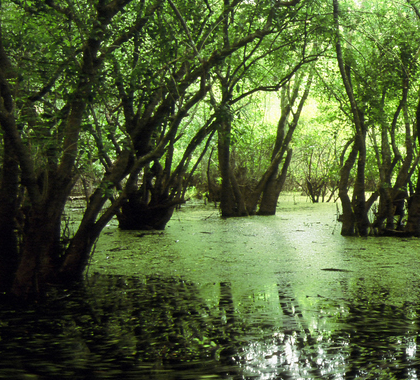Fulfilling a campaign promise he made to farmers, ranchers, and other landowners, President Donald Trump ordered the Environmental Protection Agency (EPA) and the U.S. Army Corps of Engineers to “review and reconsider” an Obama-era rule greatly expanding federal jurisdiction over small bodies of water nationwide.
The target of Trump’s February 28 executive order is EPA’s Waters of the United States rule (WOTUS). Unveiled in May 2015, WOTUS is the Obama administration’s response to two wetlands-related Supreme Court decisions: Solid Waste Agency of Northern Cook County v. U.S. Army Corps of Engineers (2003) and Rapanos v. United States (2006).
The court decisions restricted the federal government’s power to regulate what are referred to in the Clean Water Act (CWA) as “navigable waters of the United States,” but the rulings, which were made by divided courts, only provide vague guidance concerning what waters should be considered navigable or significantly connected to navigable waterways.
In crafting WOTUS, the Obama EPA effectively removed the word “navigable” from the phrase “navigable waters of the United States” in the CWA. That greatly expanded the types of wetlands and other bodies of water subject to regulation under the CWA, triggering the need for federal permits or other authorization for activities that could affect newly regulated waters.
Twenty-seven states sued EPA to block WOTUS, and on October 9, 2015, the Sixth Circuit Court of Appeals stayed WOTUS nationwide. The rule has been on hold since.
‘A Horrible, Horrible Rule’
In issuing his executive order, Trump left little doubt about how he felt about WOTUS.
“It’s a horrible, horrible rule,” Trump said in a White House ceremony before signing the order. “Has sort of a nice name to it, but everything else is bad. The Clean Water Act says that the EPA can regulate navigable waters, meaning waters that truly affect interstate commerce.
“But a few years ago, the EPA decided that navigable waters can mean nearly every puddle of every ditch on a farmer’s land, or any place else they decide,” said Trump. “It was a massive power grab. The EPA’s regulations are putting people out of jobs by the hundreds of thousands.”
Executing Trump’s Order
Because WOTUS has the status of a final EPA rule, it cannot be undone by an executive order alone. EPA, under Trump-appointed Administrator Scott Pruitt, announced EPA would immediately carry out the executive order. Following the language of the Administrative Procedures Act, EPA will submit a “Notice of Proposed Rulemaking” to withdraw and replace the rule. In addition, the Trump Justice Department is expected to cease defending WOTUS in court.
In his executive order, Trump also directed EPA to consider the opinion of the late Justice Antonin Scalia in the Rapanos decision, which restricted the phrase “navigable waters of the United States” to permanent standing or continuously flowing water.
‘Lifts a Huge Burden’
Craig Rucker, executive director of the Committee for a Constructive Tomorrow, says he welcomes the demise of WOTUS.
“WOTUS would have imposed federal zoning on millions of acres of private land, and getting rid of it lifts a huge burden from rural America,” said Rucker. “Now, it’s time to move on to the next step. The Trump administration needs to define what is and what is not a ‘wetland’ and insert that definition into a budget resolution, or some other appropriate piece of legislation, so it will be codified,” Rucker said. “That way, no future regulation-happy administration can come along and use the administrative process to impose a son of WOTUS.”
Merrill Matthews, a resident scholar at the Institute for Policy Innovation, says Trump’s executive order shows the benefits of having someone with business experience as president.
“The WOTUS rule reminds us it’s good to have a businessman in the White House for a change,” said Matthews. “As a hotel-builder, Donald Trump had his own run-ins with EPA.
“No one better recognizes how a federal agency, particularly EPA, can wreak unnecessary havoc on a business or landowner than someone who has wrestled with the leviathan,” Matthews said.
Bonner R. Cohen, Ph.D. ([email protected]) is a senior fellow at the National Center for Public Policy Research.





